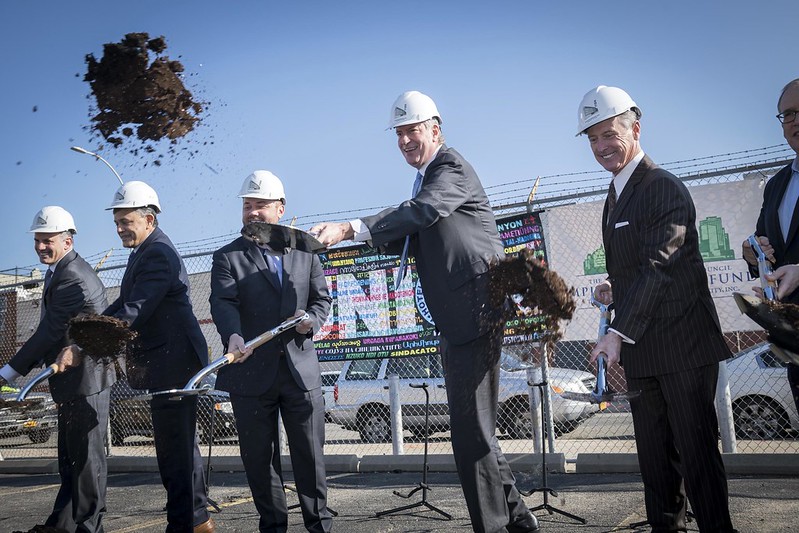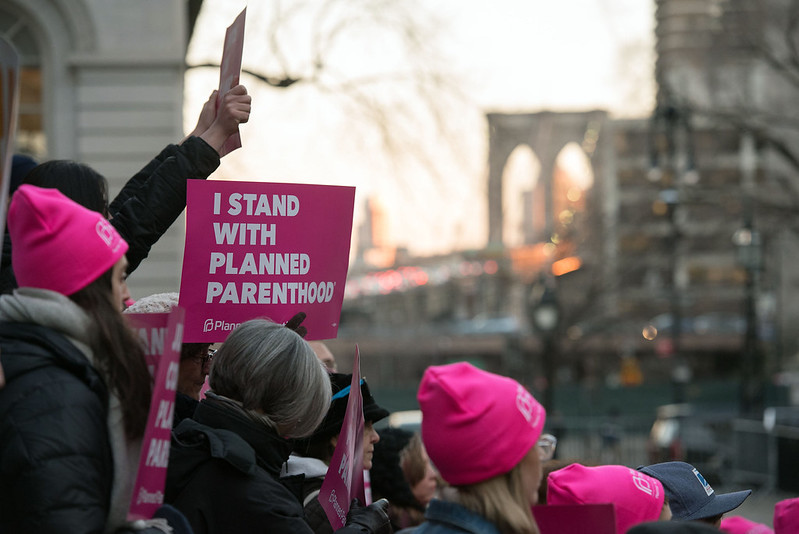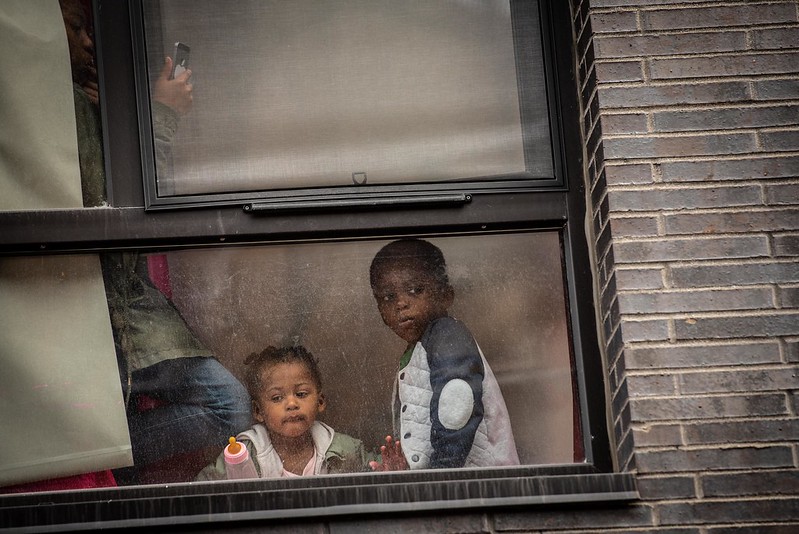A Portal Does Not Replace A Knock On The Door

The mayor at a ground-breaking ceremony (photo: Ed Reed/Mayor's Office)
The Department of City Planning (DCP) has announced that it is resuming the city’s rezoning process after a five-month suspension due to the pandemic. But DCP has neither adapted the process that leads to significant land use changes to overcome the obstacles created by the pandemic nor the underlying structural racism embedded in land use decision-making. As DCP said in a recent statement reaffirming its commitment to dismantling institutionalized racism:
“We recognize that planning policies and zoning codes have acted for decades as bulwarks against fairness, inclusion and integration, and that they have played a large role in perpetuating racism and even violence against Black and Brown Americans…We are committed to unpacking and taking on institutionalized racism within the planning profession and examining our own role…”
If the city is to restart rezoning, it cannot be under the same structurally flawed process that it has acknowledged contributes to the disparities that have plagued this country since its inception. The current crisis of the COVID-19 pandemic as well as the ongoing protests for racial justice have further exposed the fatal impacts of institutionalized racism on Black and Latino communities. Resuming this flawed process while there are still pandemic-created obstacles to outreach, education, community organizing, and public participation will cause further harm to these communities.
Community groups that DCP relied upon for “getting out the word” are swamped with the need to feed and care for residents in their neighborhoods during this pandemic and the mass unemployment that has resulted from measures taken to contain COVID-19. The city’s creation of an online portal to provide information on attending virtual DCP meetings is not sufficient and will exclude hundreds of thousands of New Yorkers, many of whom are low income. A portal does not replace door-knocking.
Additionally, budgetary changes have greatly impacted how the city will be able to respond to demands for more affordable housing. Beginning a zoning change now that relies on the current Mandatory Inclusionary Housing (MIH) mechanism is extremely problematic and fundamentally unfair due to the draconian cuts to the city’s capital budget. The funding that would have been used to deepen affordability under MIH and provide additional services to remediate the negative impacts of a rezoning has evaporated.
There are gaping holes and misguided instructions in the City Environmental Quality Review (CEQR) manual for gathering the information that goes into environmental impact statements - information essential for community boards, the City Planning Commission, and the City Council to accurately and fairly assess a zoning change before they vote on major land use changes (see more here and here).
These flaws hide the displacement and inadequacy of any anticipated affordable housing, and do not project how a zoning change will alter the racial composition of a neighborhood such as when older buildings are torn down and replaced with new “luxury condos.” The CEQR guidelines assume that tenants in buildings with six or more units are protected by rent regulation even though those protections are frequently evaded. Evictions, already highest in Black and Latino communities, are expected to rise as a result of the pandemic.
The CEQR guidelines are completely silent on the financial impacts a rezoning has on property values - critical information that communities and elected officials need when they try to negotiate with developers for more and deeper affordable housing, schools, libraries, and other community benefits.
In addition to providing resources and information essential to a fair zoning process, DCP must be creative and innovative to overcome the obstacles to communications and outreach created by the pandemic, which still threatens people’s health and undermines the existing public engagement process.
The city cannot resume land use processes that will impact Black and Latino communities without a massive effort to engage these communities. City government must be driven by the imperative to bring BIPOC into the decision-making. DCP needs to innovate ways to communicate and there are a number of measures DCP can implement today:
- The city owns, controls, or can access buildings, spaces, and infrastructure in every neighborhood, from public schools and firehouses to bus-stop shelters and subway platforms. These spaces can serve as neighborhood touchpoints with maps, descriptions of possible buildouts, and other information to alert residents about land use proposals.
- Many of these spaces are already in use for emergency services for the community and can serve an additional function as a means of outreach for projects. DCP can create displays, take-away flyers, and other materials for distribution in these areas. It is important that language services and translations are also made available to accommodate residents who do not speak English.
- The city needs to extend the timeframe and expand the means of communication wherever possible, such as keeping hearings open so people can testify over time, and facilitating locations within impacted communities where people can submit written testimony, or safely record and submit in-person video testimony, a feature Manhattan Borough President Gale Brewer has used often during public hearings; and
- If the city truly wants to improve engagement in these communities, it must provide funding and other resources to community-based organizations, now swamped with providing essential services, to augment their capacity to reach out to community members about proposed zoning changes and encourage them to participate in the process.
This pandemic has demonstrated that the city is capable of changing rules and laws quickly to accommodate extenuating circumstances. It is not merely that these are extraordinary times that require innovation in how governments must engage their residents in decision-making. Government must also be enlightened by the awareness of the long-term structural barriers to engagement that have excluded communities of color from full participation.
***
Tara Duvivier is Senior Planner and Adam Friedman is Director at the Pratt Center for Community Development, a Pratt Institute Research Center, which provides technical assistance in land use and community development in low-income communities and communities of color throughout New York City.
***
Have an op-ed idea or submission for Gotham Gazette? Email This email address is being protected from spambots. You need JavaScript enabled to view it.
More Than a Name: Planned Parenthood of Greater New York Reckons with Sanger’s Legacy and What Comes Next

Planned Parenthood supporters (photo: Ed Reed/Mayoral Photography Office)
We are in a cultural and political moment of national reckoning with systemic racism and Planned Parenthood of Greater New York is not immune. We recently announced our decision to remove our founder Margaret Sanger’s name from our Manhattan Health Center and asked the City Council to remove a street sign named after her in the East Village.
Sanger was a champion of birth control — which expanded bodily autonomy for many, including women of color — and she also supported the racist ideology of eugenics. Both of those things are true. We must grapple with the totality of her legacy to allow our patients to access the full spectrum of sexual and reproductive health care free of fear, stigma, or shame from people who work in opposition of our mission.
Immediately following our announcement, anti-abortion agitators attempted to hijack the decision as a win of their own — they have weaponized Sanger’s complicated history in their crusade against reproductive freedom, particularly for black women. Their concern is fake and harmful. Women of color know that birth control, cancer screenings, HIV testing and treatment, wellness exams, and safe, legal abortion are essential to living a healthy life.
Many abortion opponents’ policies and politicians resist the advancement of Black, Latino, queer, trans, and gender-nonbinary people whose lives are deeply impacted by systemic racism, economic injustices, and health care inequality every day. They are not aligned with our belief that every person has the fundamental human right to bodily autonomy and the freedom to thrive. Instead, they exploit Sanger's name to block access to fundamental health care and health centers.
As PPGNY faces our past and reclaims our story, we expose them and their true intent of shaming tactics to stigmatize sexual and reproductive health care and reveal their deep disdain for women of color, Black women in particular, for daring to unapologetically assert control over our bodies, even after centuries of struggle.
Women of color have long understood the impact of Margaret Sanger’s support for eugenics. More than two decades ago Dr. Dorothy Roberts wrote in Killing the Black Body, “Birth control in America was defined from the movement’s inception in terms of race and could never be properly understood apart from race again.” The women of color who created and led the reproductive justice movement have given us a powerful blueprint to connect the dots and shape our work as a reproductive rights organization by understanding women of color ‘don’t live single-issue lives’ and systemic racism shapes every aspect of our lives, including sexual and reproductive health. We are learning, listening, and committing to following that collective wisdom as we work to transform our institution.
Our decision to reckon with our founder’s legacy extends far beyond renaming streets and buildings. It includes a public commitment to transforming the way we show up in and serve our communities. Our Reviving Radical initiative asks that we: 1) confront Planned Parenthood’s legacy and contributions to historical reproductive harm of communities of color; 2) divest from and dismantle white-dominant organizational cultural norms and values; 3) adopt individual and institutional practices that value people of color; 4) center communities of color’s voices, experiences, and knowledge of selves; and 5) build accountable relationships with communities of color.
These community mandates are fundamentally about undoing the racism woven into the fabric of every institution in this country and making the human right to bodily autonomy true for all. At Planned Parenthood of Greater New York, removing Sanger’s name was an important start but it is by no means the end of this conversation.
***
Merle McGee is Chief Equity and Engagement Officer at Planned Parenthood of Greater New York.
***
Have an op-ed idea or submission for Gotham Gazette? Email This email address is being protected from spambots. You need JavaScript enabled to view it.
Housing is Health, We Must Support It As Such — Especially Now

Health and housing are inextricably linked (photo: Michael Appleton/Mayor's Office)
The nationwide protests over the past few months are a response to the tragic murder of George Floyd by Minneapolis police officers -- and to the longstanding racial injustices plaguing our nation. Among these systemic crises is housing inequity and its impact on health.
Millions of people nationwide lack stable housing due to extremely high rent, domestic issues such as living with an abuser, or various other causes. In New York specifically, hundreds of thousands of low-income residents fall into this category, with a disproportionate number of these people being Black and Latino. In this time of COVID-19 when stable housing is more critical than ever, people of color are overwhelmingly suffering from the negative health impacts of not having a home.
We must now firmly address – and federally fund -- stable housing, as a crucial pillar of public health and racial justice. New York offers a clear example of why this is so important.
For the past 15 years, rent costs in New York have spiked upwards, eating up more and more of residents’ income. With millions of New Yorkers unemployed during the pandemic and the state eviction moratorium set to end in August, many New Yorkers face an imminent risk of losing their homes. Without comprehensive federal aid for state and local governments to preserve housing stability, we also risk eliminating much of the hard-won progress New York has made in the fight against COVID-19.
Housing & Health Links
Housing has always been foundational to human survival. It is at the base of Maslow’s Hierarchy of Needs, along with food, water, and warmth. Without a home, it’s that much harder to secure a quality education, job opportunities, and maintain good health. Being homeless undermines health through many pathways, including the increase in stress, exposure to the elements and other noxious agents, and need to spend time searching for shelter. In addition to those stressors, during this pandemic, homeless people are simply unable to “shelter in place” or work or learn “from home,” further jeopardizing their safety.
While many Americans and New Yorkers specifically were already homeless prior to the pandemic, more now face the threat of homelessness once eviction moratoria end. Those at risk, especially people who are Black and Latino, report great fear for their wellbeing. Black and Latino people already account for a disproportionately high number of COVID-19 deaths in the U.S., and the risk for contracting the virus escalates when people are forced to live on the streets, doubled up with other tenants, or in the overcrowded shelter systems.
The lack of housing options creates other crises. Amid stay-at-home orders, residents with abusive partners may face a higher risk of assault yet be unable to flee for safety. Cities across the country, including New York, have reported a recent increase in domestic violence cases, with those on the front lines reporting that abusers may intentionally expose their victims to the virus or threaten to kick them out if they test positive. To these residents, being quarantined with an abuser means inescapable trauma, adding to the stress and fear associated with the virus itself.
Solutions
How can we tackle these systemic injustices? Rental assistance is the first key solution, along with programs to connect renters in need with these resources. With New York’s state and city governments facing dire budget shortfalls, federal funding for rental assistance is urgently needed.
We urge Congress to direct $100 billion in supplemental appropriations to support substantial rental assistance, and also provide flexible funds to cover additional costs to housing providers including hazard pay for employees, extra cleanings, personal protective equipment, and more.
New York State has recently launched a rental assistance program using federal CARES Act funds to provide a one-time payment for residents with the greatest need, but far more aid is required to meet the growing needs of New Yorkers now. The federal government must expand aid to New York and other hard-hit states so that programs like these can be expanded and reach more people adversely impacted by the pandemic. This will help low-income people in New York and across America stay safe in their homes – and strengthen our continued collective efforts to mitigate COVID-19.
New York State recently passed the Emergency Rent Relief Act, which will direct $100 million from the federal CARES Act to be used towards rental assistance. We urge New York City and State to continue to prioritize funds they have already received through the CARES Act to support immediate rental assistance and other measures to keep New Yorkers safely housed.
Third, we need to ensure that federal aid for unemployed people continues throughout this prolonged shutdown period. The extra money to date has prevented many families from falling into poverty, enabling them to pay rent through this time of mass unemployment.
These critical measures are urgently needed to begin to combat the disastrous health disparities experienced by Black and Latino people. It’s also necessary to maintain the progress states like New York have made in slowing the infection rates of a disease that has taken an estimated 154,000 lives in America so far. We cannot continue to allow the pandemic’s disproportionate impact on people of color. We must proactively support efforts to provide stable housing for people most likely to experience health and housing inequities, through rental assistance, continued unemployment support, and other protective measures. As our nation acknowledges deeply rooted racial inequities, these meaningful measures to protect people who are housing insecure now are a crucial step towards true racial and economic justice.
***
Judi Kende is vice president and New York market leader of Enterprise Community Partners, a nonprofit housing organization. Dr. Mindy Fullilove is a social psychiatrist and professor of urban policy and health at The New School.
***
Have an op-ed idea or submission for Gotham Gazette? Email This email address is being protected from spambots. You need JavaScript enabled to view it.




